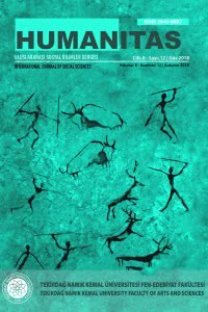Konuşan Öznenin Kılıcı Rolü : Segolene Royal’in Nükleer Santraller Konusundaki Röportajı
Politik söylemi diğer söylem türlerinden ayıran en önemli özellik, konuşucunun ikili konumudur: Politik söylemdeki konuşucu kendine adına konuşmaktan çok, temsil ettiği grubun adına söz alır. Bu makalede esas olarak, konuşucunun kılıcı rolü ve sorumluluğu araştırılmıştır. Çözümlenen bütünce, 7 Mart 2016 tarihinde, Fransız TF1 televizyon kanalındaki 20H Haber Programında gazeteci ve televizyoncu Gilles Bouleau’nun Fransa Çevre ve Enerji Bakanı Ségolène Royal ile gerçekleştirdiği bir röportajdır. Tartışma konusu, iktidardaki Sosyalist Parti’nin verdiği sözlerin gereği olarak, Fransa’daki bir nükleer santralin kapatılıp kapatılmayacağıdır. Karşılıklı konuşma söz konusu olduğu halde, çözümlemede kullanılan yöntem Konuşma Çözümlemesi değil, Söylem Çözümlemesidir. Bu çalışmada, bir çevre sorunu etrafında oluşan söylemsel özsunumu ortaya çıkarmak amacıyla, bakanın söylem biçimi ve içeriği incelenmiştir. Bakan söz, karar ve eylem meşruiyetine sahip olsa da, kararlı bir çözüm önerme konusunda çekimser durmaktadır. Kendi sorumluluğunu daha çok üçüncü kişilere yükleyen bakan, kesin bir cevap vermek yerine koşullu ve kiplikli bir söylemi yeğlemektedir. Böylece yarı-kılıcı bir özsunum ortaya çıkmaktadır. Ele alınan röportajda S. Royal’in söylemsel özsunumu şu şekilde ortaya çıkmıştır: eğitimci, kuşkucu, kararsız, muğlak. Söylemi sırasında kendiliğinden oluşan bu özsunum, röportajı yapan gazetecinin ısrarlı tutumundan kaynaklanabileceği gibi, Çevre ve Enerji Bakanının bağlı olduğu ve iktidarda bulunan siyasi partinin konu ile ilgili olarak kararsız konumlanmasıyla da ilişkili olabilir.
Anahtar Kelimeler:
Politik Söylem, Söylem Çözümlemesi, Özsunum, Kılıcılık
Semi-Agentive Ethos: Interview of Segolene Royal on Nuclear Plants
A political discourse differs from other types of discourses by the double status of the speaker who represents less him/herself than the community he/she belongs to. This article mainly aims to find out the agentivity and responsibility of the speaker. The analyzed corpus is an interview that took place in the TV news at 8 p.m. of TF1 of 7th March 2016, presented by Gilles Bouleau with Ségolène Royal, the then minister of environment and energy. The debate is about the possible closure of a nuclear plant, in accordance with the commitments of the Socialist Party that was in power. Although it is an interview, the methodology used is not conversational analysis but discourse analysis. The saying and the said of the minister have been analyzed in order to put forward how her discursive ethos is constructed around an ecological problem. Even though she has the legitimacy of speech, of decision and of action, the minister is being rather reluctant in front of a decisive solution. Instead of giving an accurate answer, she chooses for a conditional answer which is highly modal. She delegates her responsibility to others. This is how her discursive ethos appears to be near-agentive or semi-agentive.
Keywords:
Political discourse, Discourse analysis, Ethos, Agentivity,
___
- Amossy, R. (2010). La Présentation de soi. Ethos et identité verbale. Paris : PUF.
- Amossy, R. (2012). L’argumentation dans le discours. Paris : Armand Colin.
- Breton, P. (2006). L’argumentation dans la communication. Paris : Editions La Découverte.
- Ducrot, O. (1972). Dire et ne pas dire. Principes de sémantique linguistique. Paris : Hermann.
- Kerbrat-Orecchioni, C. (1998). Implicite (2e édition). Paris : Armand Colin.
- Lamizet, B. (2011). Le langage politique. Paris : Ellipses.
- Le Querler, N. (1996). Typologie des modalités. Caen : Presses universitaires de Caen.
- Maingueneau, D. (1993). Le Contexte de l’œuvre littéraire. Enonciation, écrivain, société. Paris : Dunod.
- Mayaffre, D. (2003). « Dire son identité politique ». Cahiers de la Méditerranée. [En ligne] 66 | 2003, mis en ligne le 21 juillet 2005, consulté le 11 avril 2016. URL : http://cdlm.revues.org/119
- Plantin, C. (1996). L’Argumentation. Paris : Le Seuil. Mémo.
- Reboul, O. (1991, 2013). Introduction à la rhétorique. Paris : PUF.
- Robrieux, J.-J. (2010). Rhétorique et argumentation (3e édition). Paris : Armand Colin.
- ISSN: 2147-088X
- Yayın Aralığı: Yılda 2 Sayı
- Başlangıç: 2013
- Yayıncı: Namık Kemal Üniversitesi
Sayıdaki Diğer Makaleler
Kent Merkezindeki Konut Alanlarında Ebeveynlerin Suç Korkusu: Küçük Ayasofya Örneği
Edebiyatın Hafızası Metinlerarasılık: Ferhunde Kalfa’dan Mücella’ya
Mehmet Rauf’un Halâs Romanında Aşkın Devingenliği
Travma Çözümü Olarak Anti-Natalizm
Anna Seghers’i̇n Yedinci Haç Romanında Tarihselleştirme Üzerine
Konuşan Öznenin Kılıcı Rolü : Segolene Royal’in Nükleer Santraller Konusundaki Röportajı
